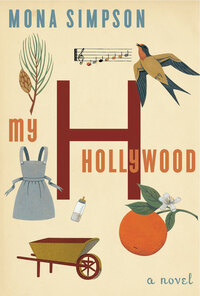My Hollywood
 Mona Simpson’s newest novel, My Hollywood, explores the relationship between upper-middle class and wealthy women in Santa Monica, and the women they hire to care for their children.
Mona Simpson’s newest novel, My Hollywood, explores the relationship between upper-middle class and wealthy women in Santa Monica, and the women they hire to care for their children.
Claire is a composer from New York, who moves to Santa Monica with her husband and baby so that her husband, Paul, can pursue his dream of writing TV sit-coms. She is successful enough, in that she is offered commissions, and receives a Guggenheim fellowship, and travels to New York to see a piece she has written performed. However, they are not wealthy by Santa Monica standards, they rent their home, and she doesn’t quite understand the money of the people around her. Claire is overwhelmed by parenthood, as so many new parents are. She cannot stop her son William from crying, she cannot focus on her work because with an infant around, who can? She is trying to find her way in her marriage, in which she used to be an equal partner, but now that Paul makes more money than her, the power seems to have shifted, and she’s not sure how to push for what she wants anymore, or how to even talk to him. Add to this the guilt so often included in motherhood…while she desperately wants to escape to her in-home office and write music, her love and passion, she is still pulled by her love for her son, she wants so badly to be with him, and wonders what she may be missing when she’s away from him. Paul works 13 – 15 hours a day, and never seems to miss either her or William, never feels any guilt. He is focused on trying to be a success, to fulfill his dreams, to provide for the family and make them proud. That is his pressure.
Lola is the middle aged nanny that they hire to care for William so that Claire can write music. She is the mother of 5 adult children, from the Philippines, and is working to earn enough money to put her youngest daughter through medical school. She was an upper-middle class woman in the Philippines, a woman who lunched with the others of her class, who had servants of her own. But in order to make enough money for medical school, she must come to America and help raise other peoples children, she must be apart from her own kids, her own husband. She misses all of the important days in their lives. She is here, not there.
Through the alternating voices of Claire and Lola, we see the pressures and deep affections that come at these women from all sides. Claire admires Lola and knows she has it good with her, and yet, she is easily swayed by the opinions of the alpha-women around her. Claire respects Claire, tolerates Paul, and adores William. She feels deep pride in her abilities, and that the other women in Santa Monica are trying to lure her away from Claire, away from William.
My Hollywood took me awhile to get into. The writing was sometimes awkward, and there were moments when I wasn’t sure what the narrator was describing. This happened with both Claire and Lola, so it wasn’t a matter of not understanding the Filipino voice. But once I really got into the story, once I got past the exhausting tedium of early parenting, I really liked the book a lot. I was touched by Claire’s fears and understanding, and especially her lack of understanding. I was more touched by Lola’s descriptions of life for herself and the other nannies and maids, of life for those who are brought in as hired help, and thought of as not quite people. Really, really interesting and touching.
2 Comments
Karen MEG
You’re right, Julie, I bet I’d like this one. We had a Filipina nanny (after my brother was born) for a couple of years… I was a tween, and I really liked her a lot. She wasn’t married, and only left us after her boyfriend proposed.
There are a lot of Filipina nannies in Canada, some friends have them and although I need a lot of help too and have thought about it- I’ve always thought it might bother me to have one raising my kids especially if she had kids of her own that she never saw. But that’s the reality.
I LOVED Her Fearful Symmetry -hope you do too- it was so different, one of the best reads for me this year. And ghosts usually scare me ;)!
OmbudsBen
There ought to be some sort of metric for how easy it is to enter into a novel’s world. I know just what you mean about struggling at first. At one extreme for me is Henry James. The first time I picked up one of his books in college I read the first 2 pages over three times (admittedly while riding a Greyhound bus) then gave it up. It took real work to wrap my brain around his complex language, but with practice I eventually got there.
At the other extreme (for me) is a book like Catcher in the Rye, which I could slip into like a comfortable shoe.
How best to measure the ease of sliding into a fictive world?
Is one end Dr. Seuss and the other James Joyce?